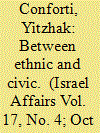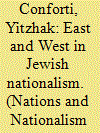| Srl | Item |
| 1 |
ID:
107911


|
|
|
|
|
| Publication |
2011.
|
| Summary/Abstract |
This article addresses two basic issues of the Zionist vision: 1. Was the Jewish state planned as an ethnic or civic state? 2. What was the character of the Zionist vision? Was it a holistic utopian vision, or a minimalist vision for creating a Jewish national state? This research concludes that the state of Israel, which developed from a nationalist ethnic-cultural movement, integrated within it ethnic values as well as Western civic values. The founders of the central wing of the movement all aspired to create a Jewish national state that upheld these values. Furthermore, the planning of the Zionist Utopia by the central group of the Zionist leadership was usually realistic and minimalist, not holistic. This position enabled the leadership to strike a balance between vision and reality, and to address the historical circumstances on the path toward establishment of the state.
|
|
|
|
|
|
|
|
|
|
|
|
|
|
|
|
| 2 |
ID:
095094


|
|
|
|
|
| Publication |
2010.
|
| Summary/Abstract |
This article analyses the ethnic and civic components of the early Zionist movement. The debate over whether Zionism was an Eastern-ethnic nationalist movement or a Western-civic movement began with the birth of Zionism. The article also investigates the conflict that broke out in 1902 surrounding the publication of Herzl's utopian vision, Altneuland. Ahad Ha'am, a leader of Hibbat Zion and 'Eastern' cultural Zionism, sharply attacked Herzl's 'Western' political Zionism, which he considered to be disconnected from the cultural foundations of historical Judaism. Instead, Ahad Ha'am supported the Eastern Zionist utopia of Elchanan Leib Lewinsky. Hans Kohn, a leading researcher of nationalism, distinguished between 'Eastern' and 'Western' nationalist movements. He argued that Herzl's political heritage led the Zionist movement to become an Eastern-ethnic nationalist movement. The debate over the character of Jewish nationalism - ethnic or civic - continues to engage researchers and remains a topic of public debate in Israel even today. As this article demonstrates, the debate between 'Eastern' and 'Western' Zionism has its foundations in the origins of the Zionist movement. A close look at the vision held by both groups challenges Kohn's dichotomy as well as his understanding of the Zionist movement.
|
|
|
|
|
|
|
|
|
|
|
|
|
|
|
|